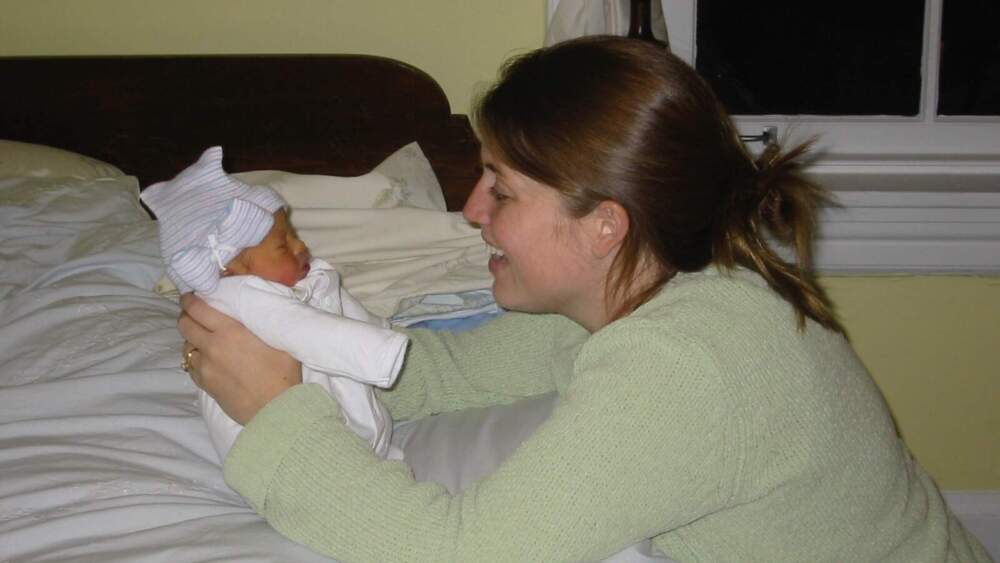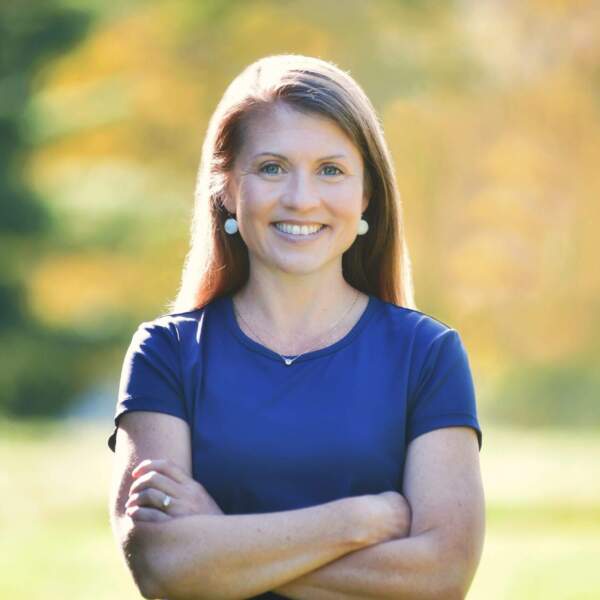Advertisement
Commentary
The future I imagine for my daughter
![The author with her teenage daughter, Penny. "[N]ow as Penny approaches adulthood, I return to that scared young woman with that beautiful new baby, and try to remember what I have learned." (Courtesy Amy Julia Becker)](https://wordpress.wbur.org/wp-content/uploads/2023/10/AJB-Penny-Walking-Final-1-1000x666.jpg)
Our daughter Penny is about to turn 18. She’s a senior in high school. She attends yearbook club on Friday afternoons. She is a cheerleader on the varsity squad in the winter and is a faithful sports fan in the fall and spring. She loves her Great Books class and sits with a loyal group of friends at lunch. Penny also has Down syndrome. And while much of her high school experience has looked like that of a typical teenager, her future is uncertain.
After high school, should she go to a community college? Should she participate in a transition program? Will she be segregated and only socialize with peers with intellectual disabilities? Will she be able to find a job?
Before Penny turns 18, we need to decide whether we will petition to become her guardians. We have been advised to set up an ABLE account since any income above $2,000 in her name makes her ineligible for Social Security benefits. To that end, we need to apply for Social Security, and for Husky-C (Connecticut’s Medicaid coverage for people with disabilities). We need to investigate options for semi-independent living when she gets older.
!["[Penny] loves her Great Books class and sits with a loyal group of friends at lunch," writes Amy Julia Becker. "Penny also has Down syndrome. And while much of her high school experience has looked like that of a typical teenager, her future is uncertain." (Courtesy Amy Julia Becker)](https://media.wbur.org/wp/2023/10/cheerwork-400x371.jpg)
I experienced a similar sense of disorientation in the early days of Penny’s life. I didn’t know who to talk to. My friends with typically developing kids couldn’t relate. I couldn’t imagine how things would ever work out. And I felt grief for the baby I thought I’d have, a hypothetical child who had never in fact existed. I felt inadequate in the face of the alphabet soup of legislation and agencies that might help us. I couldn’t envision a good future for her or for us as a family.
Early on, fear shaped my imagination. I felt threatened by doctors who, I imagined, saw Penny’s life as a burden. I saw prejudice in my interactions with teachers. I felt like I ran into the "r word" at every turn. And hearing any word that denigrated people's intelligence stung. Developmental milestones haunted me. Comparisons to typical kids felt threatening.
Then my husband Peter and I noticed that when Penny was away from us — when I was on a walk with my mom, when Penny was at daycare, or even asleep in her crib — fear entered the room like a gas, taking up all the space, threatening suffocation. But when Penny was present — with her tiny features, her wide, sparkling eyes and floppy limbs — the fear dissipated. The grief lifted. When one of us held her in our arms, our love for her overpowered our fear and tethered us to the present moment.
Slowly, love began to reshape our imagination. We met older children and adults with Down syndrome. Some of them worked and lived independently while others lived with their parents in adulthood. We read a story about a couple with Down syndrome who got married and met others who used iPads instead of spoken words to communicate. In the news we saw people with Down syndrome become models and actors, run marathons and swim across Lake Tahoe, but we also read stories of grieving parents whose kids with Down syndrome died of leukemia. I began to recognize the gift of all of these lives, and to see more love — and less fear — in their stories.
Slowly, love began to reshape our imagination.
I thought we were all alone in the maze of new parenthood with a child with an extra copy of her 21st chromosome, when instead we were invited into a community. Penny attended an integrated preschool program in New Jersey, and I will never forget the father of one of her typically developing classmates who surveyed the whole class before planning his daughter’s birthday party. He included pony rides for kids like Penny who were still unstable on their feet and offered a delightful way for all the kids to celebrate together.
I met a teenager with Down syndrome and autism who didn’t use many spoken words to communicate and carried a doll with her wherever she went. It would have been easy to see her only as a person with needs, but over the course of our night together, she was the one whose gentle presence quieted my squirming, fussy son. When I told her mother about the way he calmed down with her by his side, her mom said, “Oh yes. That’s her gift.”
Another time during a retreat at a monastery, the brother who was summoned to read a passage of scripture before our evening meal was a man with an intellectual disability. This community of men lived, served and ministered together, and they helped me imagine a similar community for Penny.
I thought we would swim through fear forever, but instead we were called to walk on solid ground, with family and friends and pastors and librarians and shopkeepers by our side. And now as Penny approaches adulthood, I return to that scared young woman with that beautiful new baby, and try to remember what I have learned. I try to remember that love is stronger than fear — at least in our house.

People with Down syndrome and other disabilities still face bias. Even in medicine. And especially in the workforce. As much as I appreciate the support offered to us by the state as we navigate the road ahead, most people with intellectual disabilities want to work but can’t find employment. This past summer, Penny had her first job placement through a program that provided 40 hours of job coaching and paid minimum wage. We hope that this experience will help to reshape the imagination of her employers, her co-workers and her customers not only so that Penny can secure a job in the future, but so that other kids like her can too.
Most sectors of our society — from schools to workplaces and places of worship — still operate with a segregated model of special programs for people with intellectual disabilities rather than living and working and worshiping side by side. I long for the day when our collective imagination reshapes itself, too.
At first, our vision for Penny’s future was shaped by what we thought wasn’t possible. Now it’s shaped by a whole host of possibilities. So we will choose, over and over again, to participate in the way of love alongside countless others and hope that the rest of the world will someday follow.
